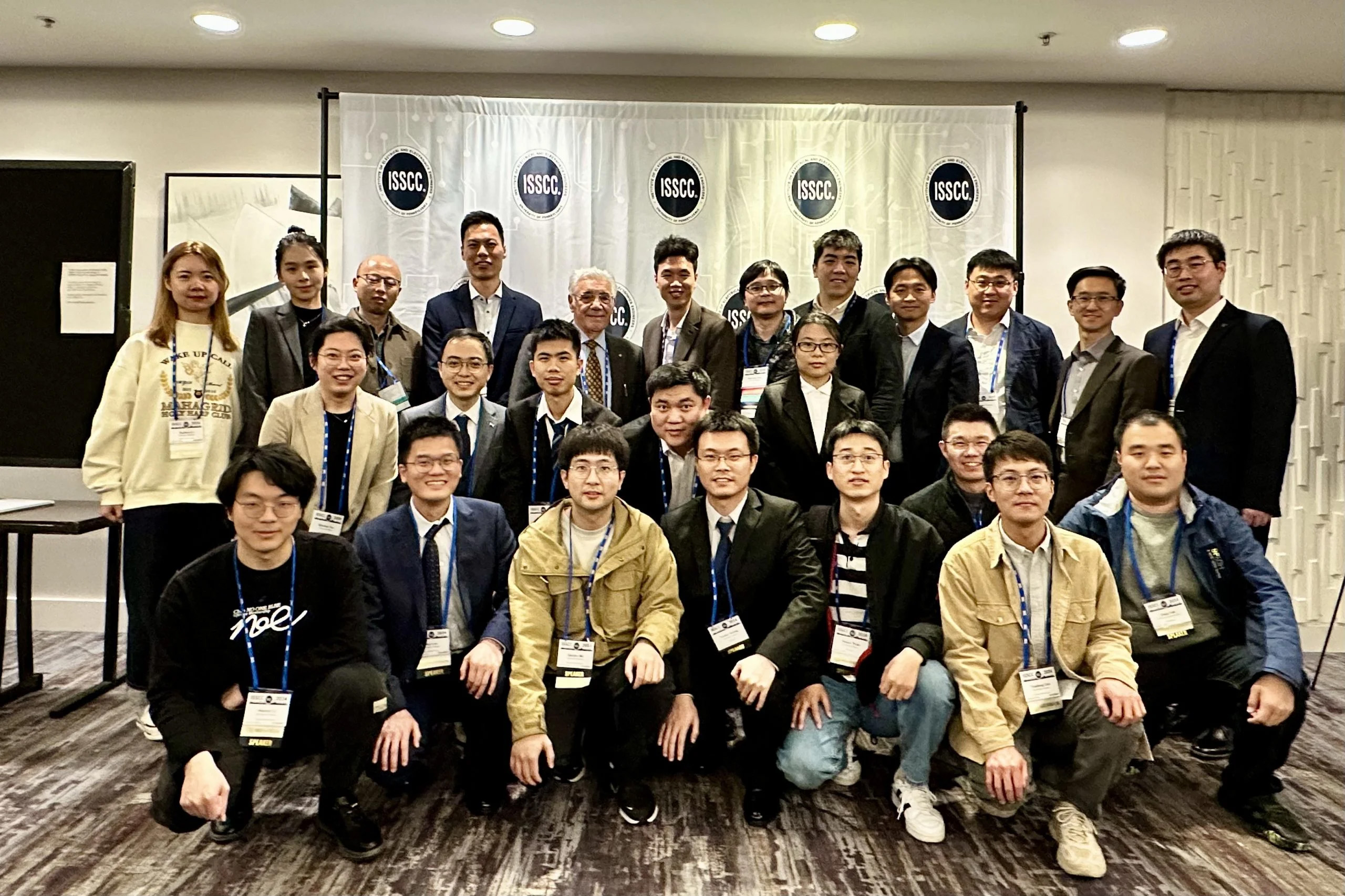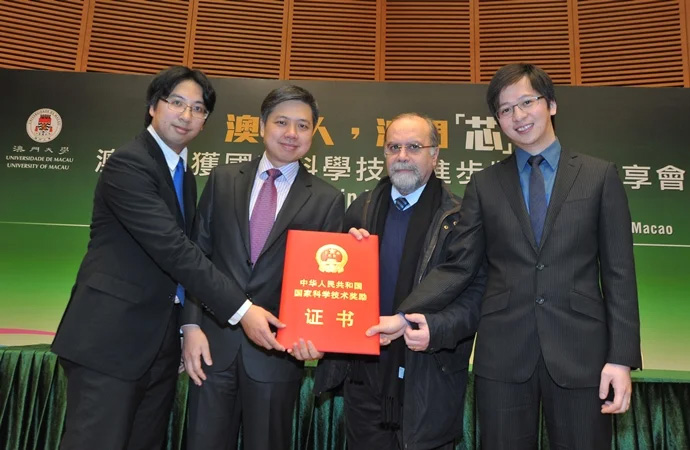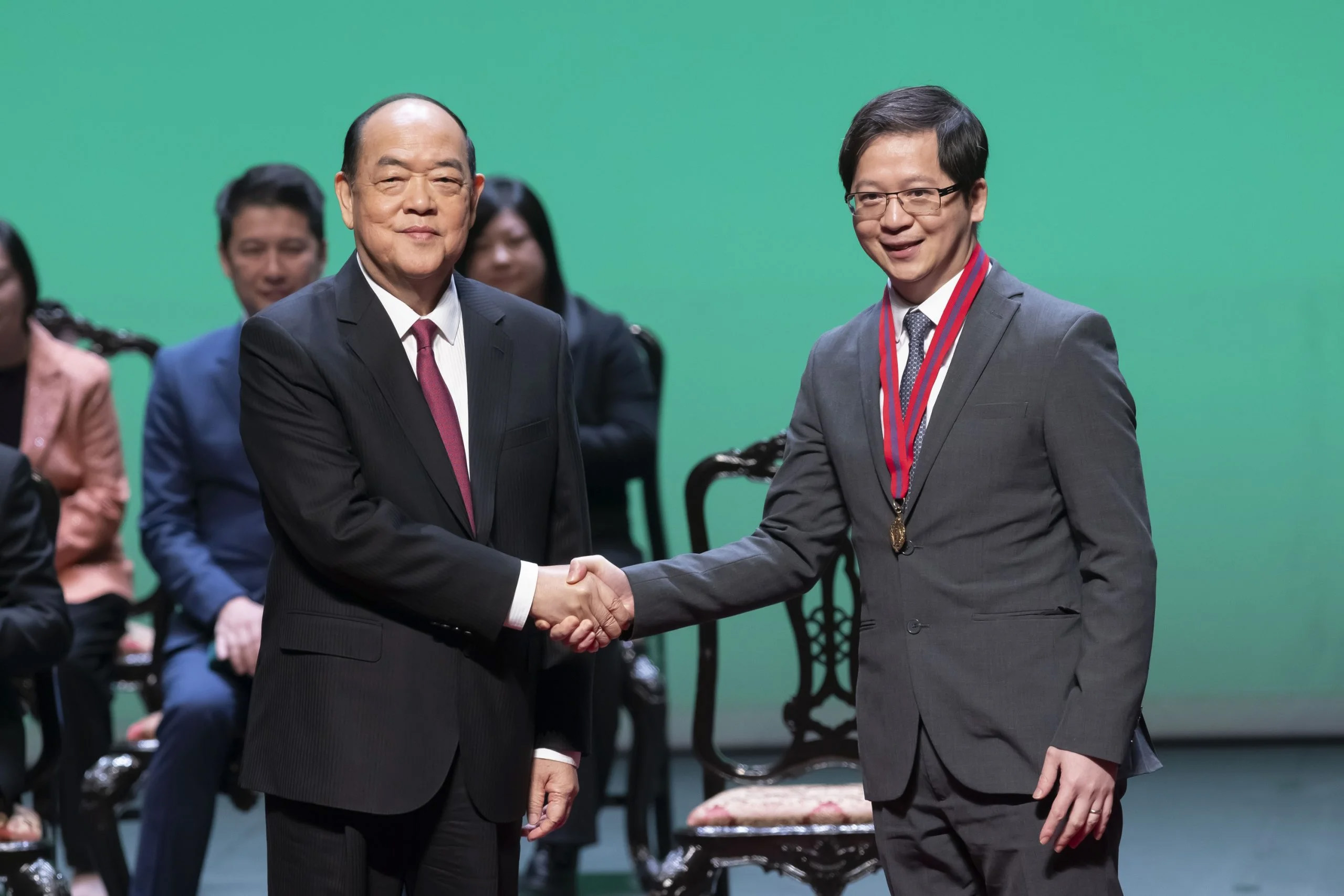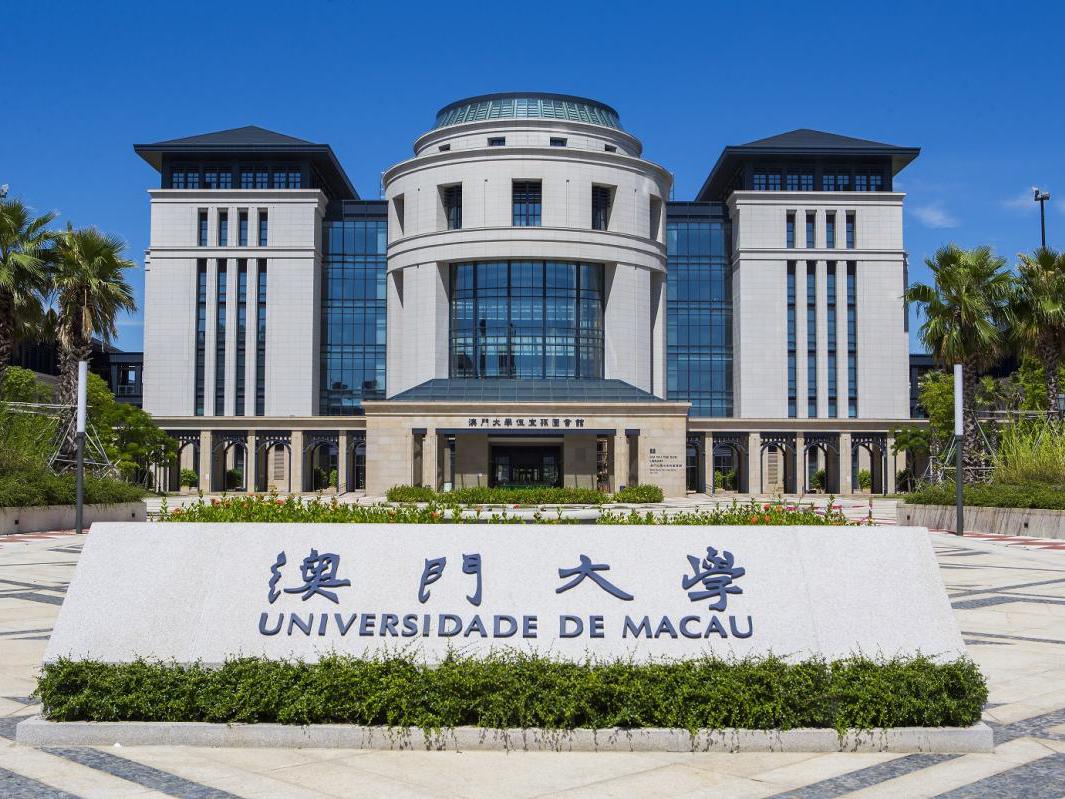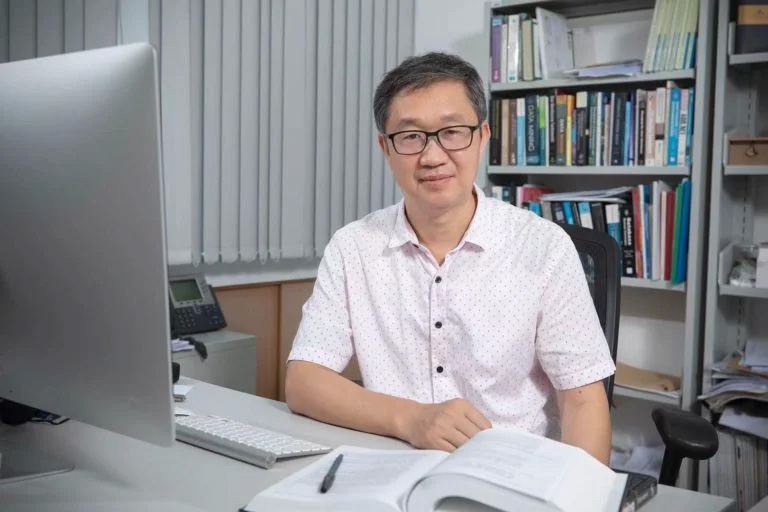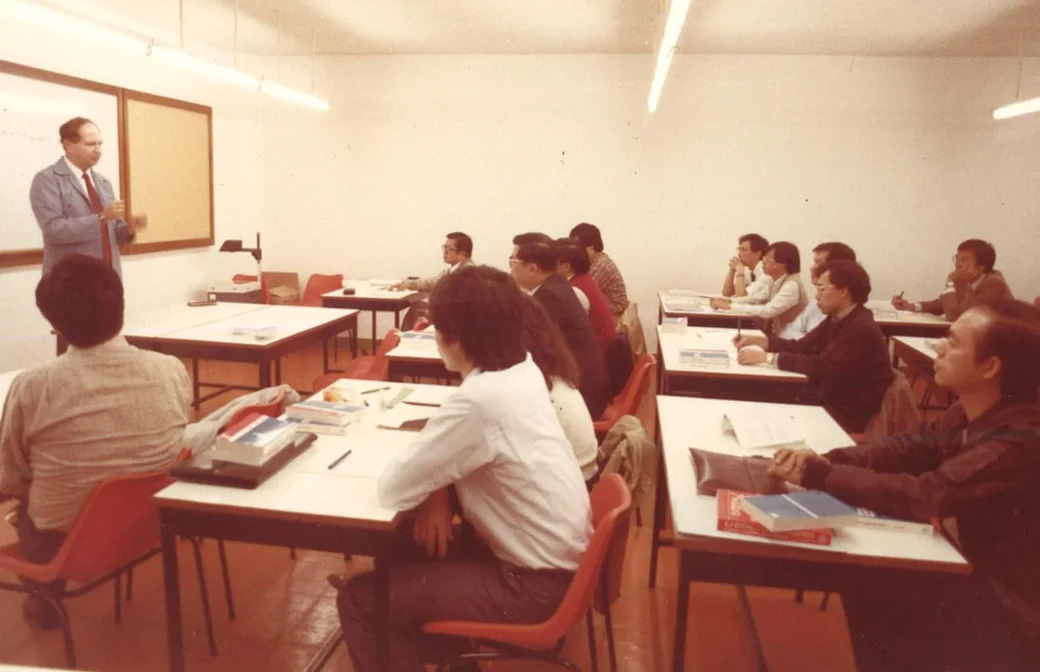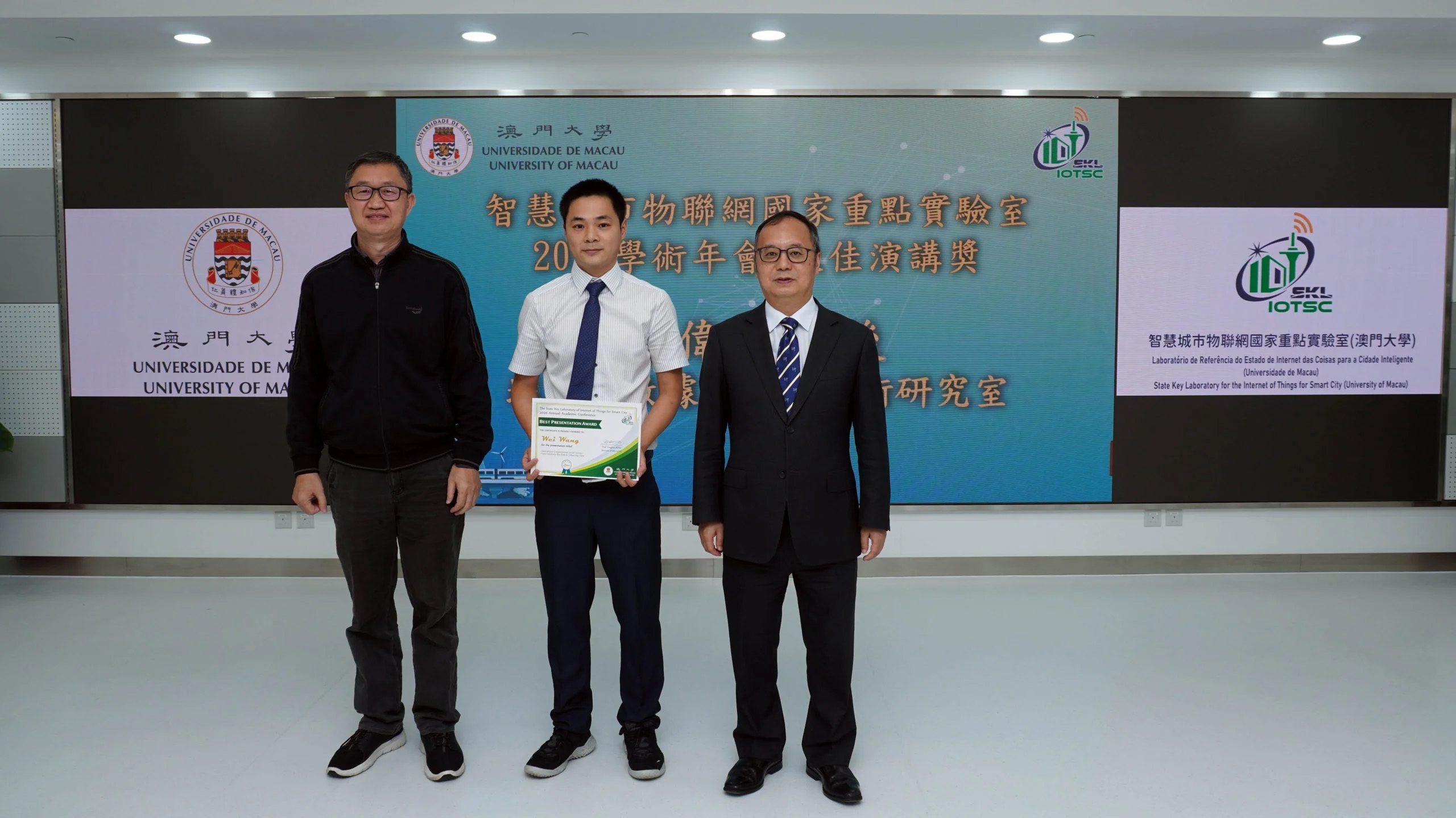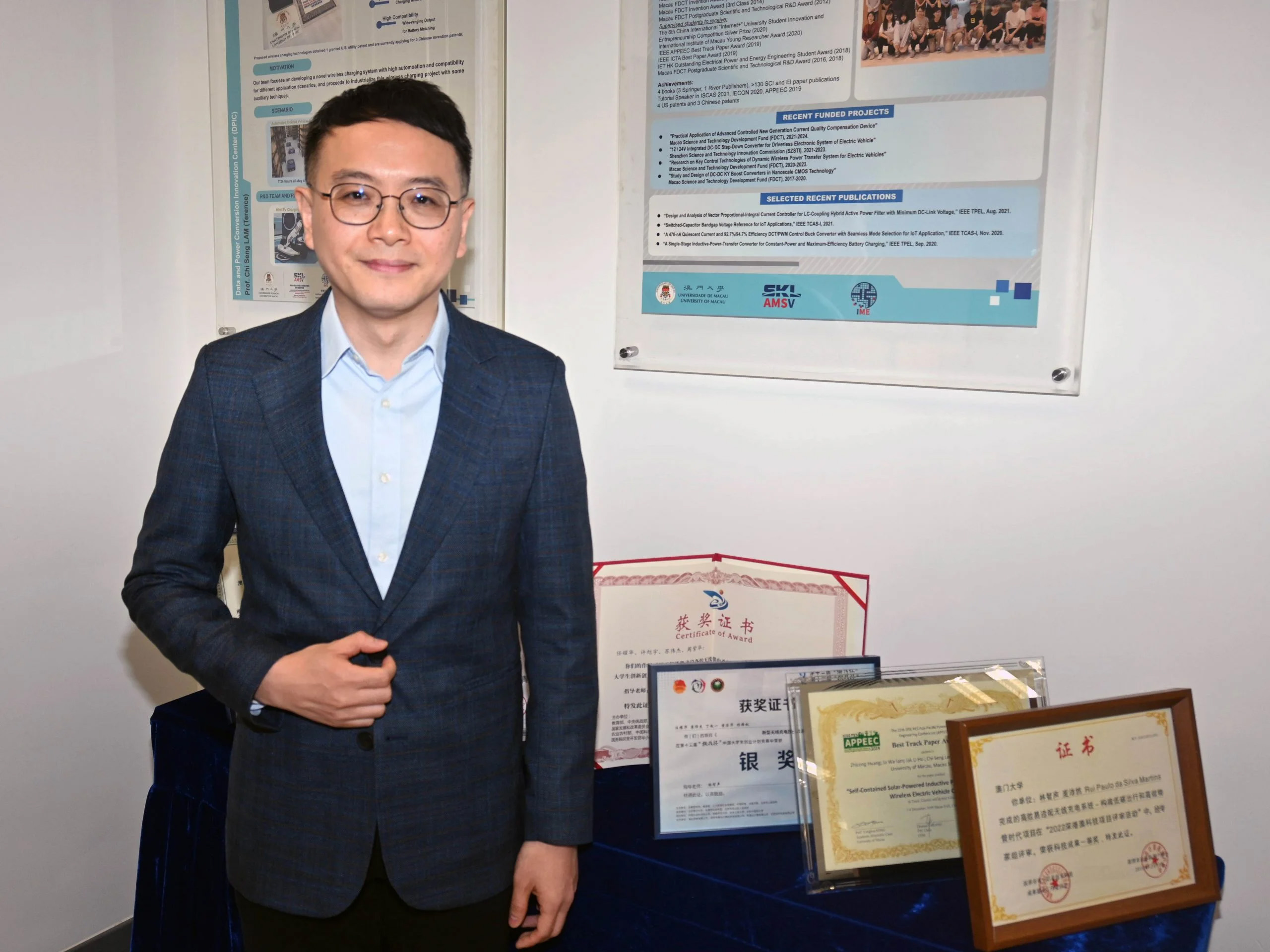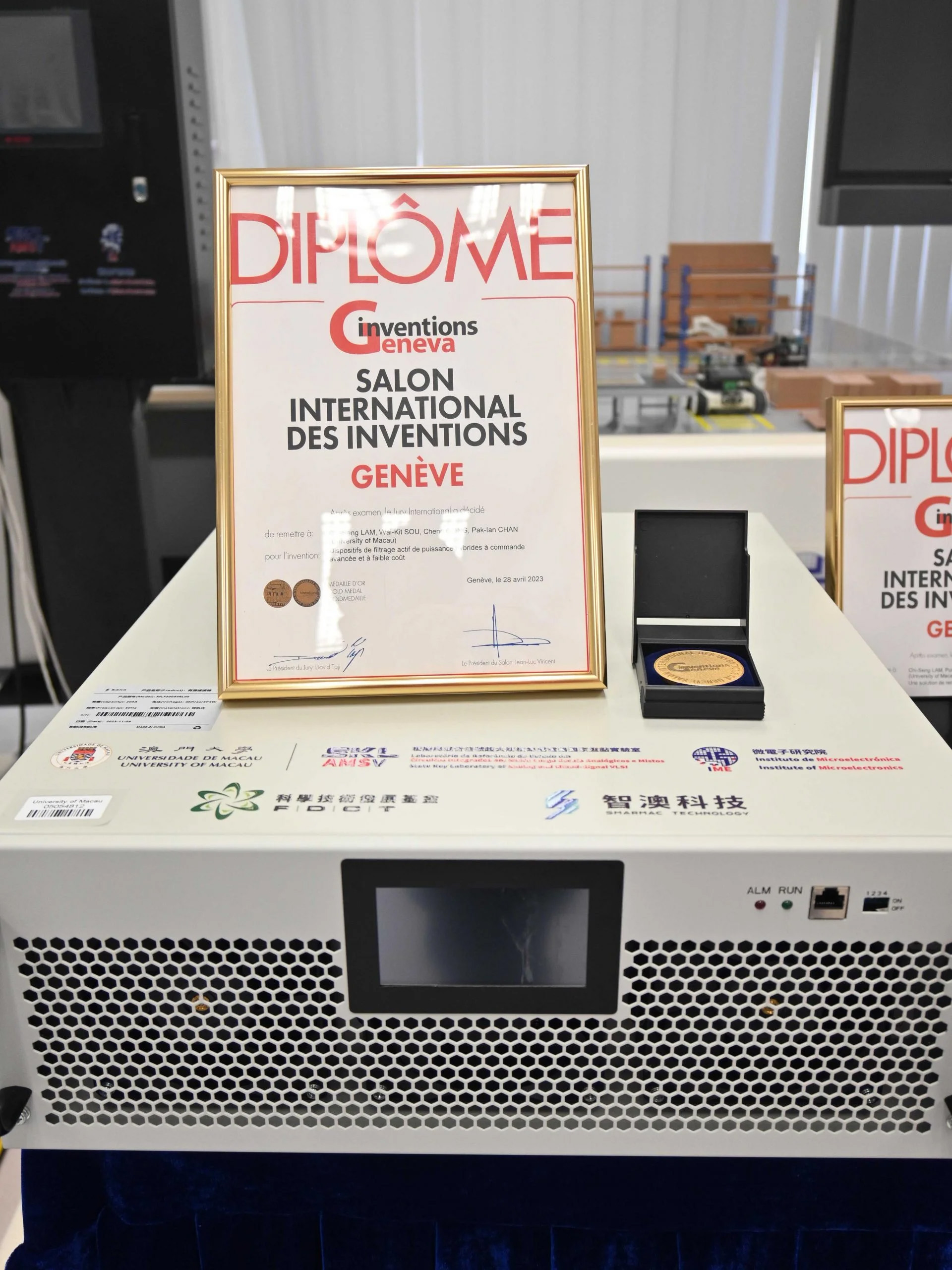In 1999, Macao returned to its motherland China, marking a pivotal moment that brought transformative changes to the city and unprecedented development opportunities for its people. The University of Macau (UM) was no exception. UM was poised to embark on a new historical era. As we celebrate the 25th anniversary of the handover, five UM members who have been with the university since 1999 share their stories and experiences that highlight the transformations of both UM and the Macao Special Administrative Region (SAR).
Establishing Macao’s reputation as a hub for chip research
This year, UM stood out at the 71st IEEE International Solid-State Circuits Conference, the world’s most prestigious academic conference in the field of electronics. UM scholars had a total of 14 papers accepted, positioning the university as the conference’s top contributor alongside South Korea’s Samsung. Mak Pui In, director of the UM State Key Laboratory of Analog and Mixed-Signal VLSI (SKL-AMSV) and deputy director of the Institute of Microelectronics, has been central to these achievements. Having dedicated 25 years to chip development and technological innovation at UM, Prof Mak has not only played a pivotal role in establishing Macao’s reputation as an international hub for chip research, but also witnessed the development of electronic engineering research at the university.
In 1999, Prof Mak started his undergraduate studies in the UM Department of Electrical and Computer Engineering. Due to his exceptional academic performance, Prof Mak was directly admitted to a PhD programme upon graduation. In 2003, when he started his PhD, his supervisor Prof Rui Martins founded the Microelectronics Laboratory. This laboratory was upgraded to a state key laboratory in 2011, and Prof Mak was involved in its development. Reflecting on his early days at UM, he says, ‘When I first arrived at the university, there was barely any electronic engineering research taking place. After Macao’s return to China, more resources were allocated to technological development, leading to continuous improvements in our laboratory’s environment.’
The research institute where Prof Mak works is now equipped with many advanced design workstations and much sophisticated testing equipment, providing strong hardware support for faculty and student research. Reflecting on the challenging conditions when the laboratory was first established, Prof Mak speaks emotionally, ‘The university repurposed a space from the parking lot in the old campus to build our laboratory. Due to its limited size, each research group had to take turns using the equipment. Despite these unfavourable conditions, our determination to pursue research remained strong.’
This determination was crucial in elevating UM’s chip research to an international standard. First receiving the Honorific Title—Merit from the Macao SAR Government in 2005, Prof Mak was also awarded the Medal of Merit—Education last month. The government’s commendations highlight several of Prof Mak’s achievements: his research ‘Two-Step Channel Selection for Wireless Receiver Front-Ends’ earned UM’s first US patent in microelectronics in 2009; his integrated circuit technology won a second prize of the State Scientific and Technological Progress Award in 2011, marking the first time Macao received this honour; and his project ‘Battery-less Intelligent Electronic Chips’ won the Tencent Xplorer Prize in 2022, making Prof Mak the first Macao scholar to receive this award. More significantly, beyond these research accomplishments, Prof Mak is deeply committed to education and is an exemplary model for his students.
Reflecting on the past 25 years, Prof Mak humbly attributes his contributions to Macao’s reputation as a chip research hub to the support from various sectors of society and the diligent efforts of his laboratory team. This reputation has also attracted students from all over the world to pursue chip research at UM. Prof Mak is confident that with the integrated development of Macao and Hengqin, UM will continue to serve as a crucial base for talent training as well as research and development. This role will enable more young people to realise their potential and contribute to the development of the country through science and technology.
Achieving research success together with scholars from around the world
Quality students and outstanding faculty are essential components of a good university. In the 2025 Times Higher Education World University Rankings, UM rose to the 180th position. ‘UM’s success today is not by chance, but the result of the sustained collaborative efforts of our faculty and staff,’ says Gong Zhiguo, professor in the UM Department of Computer and Information Science, who joined the university in 1999. Throughout these 25 years, Prof Gong has been committed to his role as a mentor for students. In the meantime, he takes pride in working with a team of researchers with international academic influence to make more academic and research achievements.
‘However, there was a time when UM struggled to attract good faculty,’ says Prof Gong, who moved to Macao with ambitious educational goals after earning his PhD from the Chinese Academy of Sciences in 1998. ‘When Macao returned to China, its economy was just modest, and both education and technology were just beginning to develop.’ Despite Macao’s initially slow development, Prof Gong was fond of this burgeoning city and believed that a new era was unfolding here. ‘At that time, UM was not very appealing to outstanding faculty from outside. Even when the university succeeded in hiring quality faculty, many of them would leave soon after.’ Prof Gong was among the few faculty members who remained committed to their roles at UM, and his dedication paid off, thanks to the advantages of the ‘one country, two systems’ policy. With the support of the central and the Macao SAR governments, UM has secured several significant historical development opportunities. The university’s teaching and research capabilities have improved substantially, significantly enhancing its appeal to outstanding faculty. Later, with the revision of the university charter, UM gained greater autonomy, which further improved conditions for recruiting top-tier academics from around the world. Today, new outstanding scholars join the university every year.
A good teacher is like a beacon, illuminating their students’ paths. As UM began to attract more high-quality faculty, its strength and reputation grew, making it more appealing to prospective students. Prof Gong notes that UM has established a new research strategy and has made significant improvements across various fields, quickly emerging as a notable institution. This transformation has positioned UM as an attractive destination for postgraduate students. Prof Gong, who is involved in student recruitment, has observed a remarkable shift in the university’s recruitment dynamics. ‘When I went to universities in Shanghai to recruit students more than ten years ago, many students had never heard of UM. But the situation has fundamentally changed. Now, we receive applications every year from graduates of top universities around the world. They are eager to further their studies at UM.’
Prof Gong believes that UM’s research strategy closely aligns with the overall development of the country and addresses Macao’s development needs. The university also closely follows contemporary digital trends and enjoys broad development prospects. Established in 2018, the State Key Laboratory of Internet of Things for Smart City (SKL-IOTSC) serves as UM’s platform for conducting cutting-edge AI research. As one of the founding members of SKL-IOTSC, Prof Gong stresses that the establishment of the laboratory has not only expanded the university’s research capabilities, but also played a key role in attracting and retaining high-calibre talent in Macao. He says, ‘The strong faculty team at UM and our continuously improving research strength mutually enhance each other, propelling the university to new heights in scientific and technological innovation.’
Driving Macao’s development through scientific and technological innovation
For Macao, diversifying its economy is essential, and developing the high-tech industry is a key strategy to achieve this goal. Recognising the importance of commercialising research results to the development of the high-tech sector, UM has established a one-stop service platform to support faculty and students in bringing their technological inventions to the market. In recent years, UM has successfully incubated many technology start-ups. Among them is Smarmac Technology Company Limited established by local UM doctoral graduates. The company is committed to industrialising its advanced power electronic systems, including a power quality compensator with advanced control technology and an efficient smart wireless charging system, for various applications. Lam Chi Seng, associate professor in the Institute of Microelectronics, SKL-AMSV, and the Department of Electrical and Computer Engineering in the Faculty of Science and Technology, is a key player in the company.
Prof Lam, who started his studies at UM in 1999, humorously notes that the idea of industry-academia collaboration felt like pie in the sky 25 years ago. ‘Back then, it seemed like a pure fantasy to think that I could one day achieve something significant with my colleagues and students through technological innovation,’ he shares. Despite these doubts, Prof Lam made an important decision after completing his master’s degree at UM—he resigned from his administrative position at the university’s Campus Development and Engineering Sector and gave up a promotion opportunity. ‘I wanted to challenge myself, so I decided to pursue a PhD in electrical and electronics engineering at UM,’ he explains. This decision took a considerable amount of determination and courage.
Prof Lam has realised his commitment to an academic and research career. Dedicated to his goal of improving life quality through technology, Prof Lam and his team have developed several groundbreaking technologies. These include a low-cost and low-loss power quality compensator with advanced control technology, which has earned multiple patents and won the gold award at the 48th Geneva International Exhibition of Inventions; and an efficient dynamic wireless charging system to which Prof Lam has dedicated his efforts in recent years. The applications of the wireless charging system are extensive. For example, the system enables unmanned ships to operate without the need for manual battery replacement or wired charging, thus saving human resources. Similarly, in smart logistics warehouses, the ability to continuously charge automatic guided vehicles around the clock while they are in operation can significantly enhance logistics efficiency. Recognising the transformative potential of these technologies, Prof Lam, with the support of the UM Centre for Innovation and Entrepreneurship, helped his students establish Smarmac Technology Company Limited. By designing and developing advanced power electronic systems specifically for enterprises, the company has successfully transformed research results into practical applications.
Reflecting on his journey, Prof Lam expresses gratitude for the strong support the country has provided to Macao, as well as the backing from the Macao SAR Government and UM, which has enabled researchers like him to pursue their dreams. He is also thankful to his PhD supervisor Han Ying Duo, whose guidance and mentorship played an instrumental role in his development and research career. Prof Lam believes that the rapid development of science and technology in Macao since the handover has not only led to remarkable research results with promising applications, but also created opportunities for students to realise their research ambitions and become drivers of future industry-academia collaboration.
Source: My UM Issue 139
1999年,澳門回歸祖國,這一歷史性時刻不僅為這座城市帶來翻天覆地的變化,更為生活在這座城的人們帶來了前所未有的發展機遇。從這一刻開始,澳門大學亦邁上了新的歷史征程,今期《澳大人》將駛著時光機,載上五位自1999年與澳大同行的師生,分享25年來與澳大共成長、與澳門特區共發展的故事。
鑄造澳門科研「金名片」
在電子領域最負盛名的國際電機電子工程師學會(IEEE)國際固態電路研討會(ISSCC)第71屆會議上,澳大憑藉14篇獲大會接納的研究論文,與韓國三星並列全球第一。「澳門芯」寫下澳門科創傳奇,令澳門科創閃耀國際舞台,率領團隊的模擬與混合信號超大規模集成電路國家重點實驗室主任、微電子研究院副院長麥沛然教授功不可沒,他為澳大芯片發明和技術創新奮鬥25年,見證澳大電子工程研究的發展。
1999年,麥沛然入讀澳大電機及電腦工程學系。因成績優異,本科畢業時獲破格直接錄取讀博。就在他開始攻讀博士的2003年,他的導師馬許願教授創建了微電子實驗室,2011年升格為國家重點實驗室,麥教授一直參與其中。「初到澳大時,電子工程研究相對空白,後隨著澳門回歸,投放於科技發展的資源增加,我們的實驗環境不斷改善。」
如今,在麥教授工作的研究院裡,配備了多部先進的設計工作站和精密的測試設備,為從事實驗研究的師生們提供足够的硬件支持。當再次憶起實驗室建設初期的窘迫環境,麥教授依然感慨,「學校當年從舊校停車場騰出空間,籌建實驗室。由於面積有限,各研究組需要輪流使用實驗設備,但即使條件所限,仍無礙我們做好科研的決心。」
正是這股不屈不撓的精神,令澳大的芯片研究一步步邁向國際水平。曾於2005年獲澳門特區政府頒授「功績獎狀」的麥教授,上月再獲授予「教育功績勳章」,他的建樹詳見於授勳介紹中:2009年,主導的「用於多制式接收器的雙階段頻道選取技術」為澳大帶來首個在美國註册的科技專利。2011年,參與研發的集成電路技術獲頒國家科學技術進步獎二等獎,是澳門首次獲此殊榮。2022年,他研發的無電池智能電子技術榮獲騰訊Xplorer科學探索獎,成為澳門首位獲此殊榮的學者。更重要的是,他以身作則,為學生樹立典範,潤物細無聲。
回望過去25載,謙遜的麥沛然教授形容是仰賴社會各方的支持,以及實驗室團隊日夜辛勤付出,才打造出「澳門芯」這一張澳門科研的「金名片」,令澳大逐漸成為各地莘莘學子慕名而來參與芯片研發的理想地。他深信未來在澳琴一體化發展下,澳大將繼續發揮好人才培養和研發基地的角色,讓更多的年輕人施展才華,為科技興邦貢獻自身力量。
與全球學術精英為伍
一間好的大學,離不開優秀的學生和卓越的師資。澳大在2025年度泰晤士高等教育世界大學排名中躍升至第180名,「澳大取得今天的成績絕非偶然,而是師生長時間共同努力的成果」,與澳大同行25年的電腦及資訊科學系教授鞏志國概括道。他1999年加入澳大,一方面堅持做好學生引路人的角色;另一方面,他以擁有一群具國際學術影響力的同儕為傲,攜手為學術和科研打拼。
「不過,澳大都走過聘請師資難的歲月」。1998年博士畢業於中國科學院的鞏志國,抱著一顆育人心來到澳門。「回歸時澳門經濟一般,教育、科技都是剛起步」,但他喜歡年輕的澳門,認定這裡將會掀開新篇章。「當時澳大對外地優秀師資的吸引力不大,即便到位後,亦不時見到有同窗離開大學。」鞏教授對教研崗位的堅守,因「一國兩制」優勢的逐步彰顯而得到回應,在中央和特區政府的支持下,澳大迎來多個重大的歷史性發展機遇,教研實力全方位提升,對優秀師資的吸引力大增。後來通過修改大學章程,辦學自主權續增,為全球延攬學術精英進一步創設條件,如今每年均有傑出學者加盟。
好的導師,猶如照亮學生奔赴前程的明燈。師資已具,大學實力遞升,「趕路人」亦應聲而來。鞏教授觀察道,澳大的新科研格局逐漸形成,在多個領域急起直追,成為後起之秀,令不少研究生將目光投向澳大。參與招生工作的鞏教授,對招生由難及易的轉變印象深刻,「十多年前,我到上海高校招生,當時學生都說沒聽過澳大。但時移世易,情況已發生根本性轉變,如今我每年都收到海外一流高校的畢業生叩門,希望到澳大深造。」
鞏教授認為,澳大的科研佈局緊扣國家發展大局,回應澳門發展所需,同時亦順應世界數字時代趨勢,前景廣闊。2018年成立的智慧城市物聯網國家重點實驗室,為大學走在AI前沿搭建平台,而鞏教授也是實驗室籌建成員之一。他指出,大學此舉不僅進一步擴展科研領域的版圖,將成為吸引高端人才、優秀人才聚澳、留澳的動力,「日益強大的師資團隊、不斷提升的科研實力相得益彰,使澳大在科技創新的時代走得更遠。」
把握科創興澳的機遇
經濟適度多元發展,是澳門的必答題,並非選擇題。答題方向之一,是高新科技產業,而解題的條件之一,則是科研成果轉化。澳大主動擔當起其中一位「解題人」的角色,搭建起促進科研成果轉化的一站式服務平台,支持師生把技術發明推向市場,經由澳大孵化的科技初創企業,近年亦如雨後春筍般出現。由本地博士畢業生校友組建的智澳科技有限公司,致力將其研發的先進電力電子系統,如先進控制電流質量補償節能裝置、高效無線智能充電系統推向多元的應用場景,而公司的關鍵一角,正是微電子研究院、模擬與混合信號超大規模集成電路國家重點實驗室、科技學院電機及電腦工程系副教授林智聲。
1999年入學澳大的林教授,嘗試想象坐時光機回到25年前的情景,笑言若在彼時談產學研創新,可謂天方夜譚,「當時的我,應該無法想象有一日能够和我的同事、學生,透過科創闖出屬於自己的一片天。」但儘管如此,他從澳大碩士畢業時還是做了人生的一個重要決定:放棄了當時大學校園發展及工程處的行政職位及晉升機會。「我還是想挑戰自己,於是下定決心,繼續在澳大深造讀博,專攻電力電子技術」。他笑稱,這個選擇還是需要一定的決心和勇氣。
林教授沒辜負毅然投身學術科研路的自己,秉持著以科技改善生活的初心,他奮鬥至今,與團隊一同自主開發多項嶄新技術,包括獲得多項專利及第48屆日內瓦國際發明展金獎的低成本和低損耗先進控制電流質量補償節能裝置,以及近年專注的高效動態無線充電系統。後者的應用場景十分多元,試想象一下,如果無人船可以無線充電,就能省卻為替換電池或有線充電而配置的人力資源;再想象一下,在智能物流倉庫內,如果可以為自動導引車 (AGV) 邊走邊充,實現24小時無間斷充電,物流效率就能大大提升。於是,林教授協助學生,在澳大創新創業中心的支持下成立了智澳科技有限公司,專門為企業度身設計及開發先進電力電子系統,成功實現產學研轉化。
回望成長之路,林教授感恩澳門得到國家的強大支持,感激澳門特區政府及澳大擔當科研人員追逐夢想的強大後盾,亦感謝他的博士導師─韓英鐸院士的引領及意見、對他的成長及科研之路影響深遠。他認為,回歸後,澳門科技發展迅速,不僅誕生出具備應用前景的科研成果,更讓莘莘學子擁有實現科研夢的機會,成為未來產學研融合創新的推動者。
來源:《澳大人》第139期


